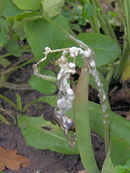European Journal of Plant Pathology (2013) 135, 581-593
From Pestinfo-Wiki
 | Selected publication you are invited to contribute to the discussion section (above tab) |
Using crop canopy modification to manage plant diseases
European Journal of Plant Pathology 135 (3), 581-593
Abstract: Modifying crop canopies can suppress plant diseases in some crops. For example, in carrot, lateral trimming of the canopy by 30-40 % after canopy closure reduced sclerotinia rot (Sclerotinia sclerotiorum) to zero under moderate disease pressure without the use of fungicides. Trimming reduced relative humidity within the carrot canopy and increased air and soil temperature, inhibiting the formation of apothecia of S. sclerotiorum. Trimming also severed infected petioles, which reduced the opportunity for infection to progress to the carrot crown. Trimming combined with application of foliar fungicide was even more effective. Trimming reduced carrot leaf blights (Alternaria dauci, Cercospora carotae) in 1 of 3 years, when disease pressure was low. However, there was no advantage of combining trimming and fungicide sprays for leaf blight control. Canopy modification also reduces disease in legume crops. Soybean cultivars with reduced height and lodging, and early maturity, had up to a 74 % reduction in apothecia of S. sclerotiorum within the crop, and up to an 88 % reduction in disease incidence at harvest. In field pea, artificially supporting plants to reduce lodging, in combination with fungicide application, reduced the severity of mycosphaerella blight (Mycosphaerella pinodes) on pods by 67 % and increased seed yield by 54 %. In chickpea, paired-row planting that opened the canopy increased seed yield by 12 %, likely by increasing fungicide deposition. Modifications of the crop canopy can reduce disease, the need for fungicide sprays, and sometimes improve fungicide efficacy, but the results are often pathosystem-specific.
(The abstract is excluded from the Creative Commons licence and has been copied with permission by the publisher.)
Link to article at publishers website
Database assignments for author(s): Mary Ruth McDonald, Bruce D. Gossen, Greg J. Boland
Research topic(s) for pests/diseases/weeds:
environment - cropping system/rotation
Pest and/or beneficial records:
| Beneficial | Pest/Disease/Weed | Crop/Product | Country | Quarant. |
|---|---|---|---|---|
| Sclerotinia sclerotiorum | Carrot (Daucus carota) | |||
| Alternaria dauci | Carrot (Daucus carota) | |||
| Cercospora carotae | Carrot (Daucus carota) | |||
| Didymella pinodes | Pea (Pisum sativum) |